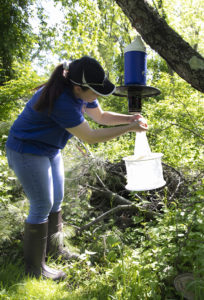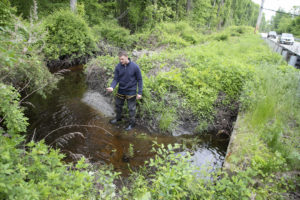Morris Residents: Join the Battle to Reduce Spring and Summer Mosquito Infestation
Published on June 01, 2019
Number One Tool: Eliminate Standing Water from Your Property
Morris County's mosquito control teams have been attacking wet and swampy areas of the county over the past few months, and continue working hard to treating and eliminating breeding grounds for mosquito larvae.
While those efforts can pay major dividends in minimizing infestation in some of the county's wettest areas, the county's individual property owners have the ability to make a major difference in reducing mosquitoes to a tolerable level around your homes or apartments.
 (JPG, 1020KB) Mosquito Control inspector Walter Jones looks for evidence of mosquito larvae in stands of swampy water in Lincoln Park.
(JPG, 1020KB) Mosquito Control inspector Walter Jones looks for evidence of mosquito larvae in stands of swampy water in Lincoln Park.
You can reduce the number of mosquitoes in your own backyard, including the aggressive Asian Tiger variety, by eliminating all standing water on your property. Check for stagnant water in containers like planters, children's toys, birdbaths, clogged gutters, wheelbarrows, trash can covers, tarps, old tires, construction materials, or unused swimming or wading pools.
A wheelbarrow filled with water, for example, can result in the infestation of an entire neighborhood. An untended pool can produce a million mosquitoes over the summer. A single soda cap of water can produce 200 mosquitoes every week.
We understand the problems mosquitoes can cause in the day-to-day lives of county residents, especially those living near major wetlands. So, our county mosquito control teams work year-round to deal with major mosquito breeding grounds,'' said Morris County Freeholder Stephen Shaw.
We can use the public's help,'' added Morris County Mosquito Division Superintendent Kristian McMorland. If everyone would take steps around their own homes to eliminate standing water, it could reduce the number of mosquitoes by many hundreds of thousands, if not millions, where you live.''
 (JPG, 1MB)
(JPG, 1MB)
In addition to the nuisance, mosquitoes also bring the possibility of diseases such as West Nile Virus, Eastern equine and St. Louis encephalitis, which are transmitted through mosquito bites.
Mosquitoes spend their juvenile life stage in the aquatic environment and go from egg to adult in about one week during the summer. Since many mosquitoes travel only 1,000 feet from where they spawn, eliminating pockets of water on your property can dramatically improve your own outdoor quality of life, he said.
Prevention is the goal for both residents and county Mosquito Control Division staffers.
The Mosquito Control team spends 80 percent of its efforts on prevention since it is both the most effective €“ and most cost effective -- way to reduce the mosquito population. Minimizing areas of standing water to limit breeding grounds is the first line of defense, followed closely by controlling larvae before adult mosquitoes develop.
Water management is as simple as clearing waterways to allow streams to flow freely.
Mosquito inspectors travel the county, checking known trouble spots for mosquito larvae, which are treated with larvicide. One product used by the teams is made from bacteria found in soil, and which attached to ground-up corncobs. The product targets only mosquitoes, and not other life forms in vernal pools, said staff biologist Mike Rosellini.
In heavily infested areas, such as the Passaic River floodplain, county teams employ helicopters, trucks, all-terrain vehicles and back-mounted sprayers to deal with infestation.
Visit https://morriscountynj.gov/mosquito/for the upcoming spraying schedule.
 (JPG, 1MB) Biologist John Rosellini checks out a potential mosquito breeding ground
(JPG, 1MB) Biologist John Rosellini checks out a potential mosquito breeding ground
Steps you can take to reduce mosquito populations include:
- At least once a week, empty water from flowerpots, pet food and water dishes, birdbaths, swimming pool covers, buckets, barrels, and cans;
- Check for clogged rain gutters and clean them out;
- Poke holes in trash cans and recycling containers;
- Recycle discarded tires, and remove other items that could collect water;
- Check for containers in places that may be hard to see, such as under bushes or under your home;
- Aerate ornamental pools or stock them with fish like fathead minnows;
- Do not allow water gardens to stagnate;
- Clean and chlorinate swimming pools, including those not in use (mosquitoes may even breed in water that collects on pool covers);
- Dispose of cans, plastic containers, ceramic pots or similar water-holding containers that have accumulated on your property
For more details on mosquitoes, visit: https://morriscountynj.gov/mosquito/info/
Also, check out the following videos for good advice on dealing with mosquitoes: https://www.youtube.com/watch?v=G_ekfQ-F4F4 or https://www.youtube.com/watch?v=eiQXLZnU7lA